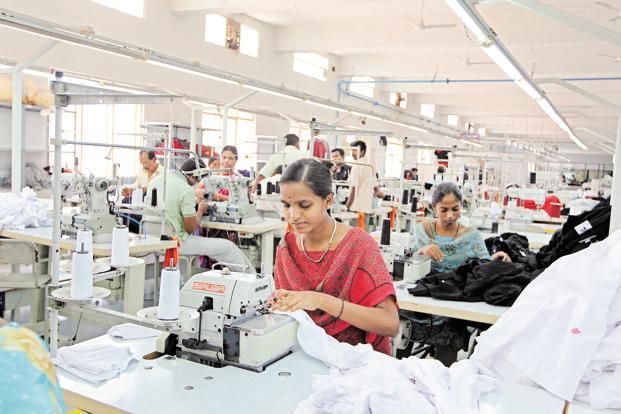Co-Written by Kamalesh Roy & Anuja Dutta

For three decades now, Tirupur – a town in Tamil Nadu – has been engaged in the production of fabric and garment export business. This initiative – established as a coalition of few cotton mills – has emerged as the economic backbone of nearly four lakh workers depending on a mechanized mode of craftsmanship. Sources reveal the latest annual profit in this business to be 25,000 crores ; while the immediate stakeholders of dividend are largely mill owners, global corporations like Nike, H&M, Adidas, Primark, Fila, Tommy Hilfiger, Zara, Walmart on the one hand, and regional fashion brands like Raymond, Reliance, Pantaloons, Fabindia on the other, keep amassing more and more social and economic wealth at various levels of expropriating Third World labour pools. Let us peek into the lives of garment workers of this ‘Dollar City’ a.k.a ‘Little Japan’, shall we?
Tamil Nadu ranks first in the production of readymade garments in India. The number of workers whose livelihoods centre around the art and industry of clothing is naturally high as well (more than 17 lakhs, of which factory workers exceed 33,000). The migrant workforce is mostly illiterate and low-educated landless Dalit females, travelling from the interiors of villages to more prosperous cores of survival. One major reason adding to the push-pull factors of migration is the inability to arrange a dowry out of sheer dispossession of families triggering a consequent hunt for employment in the industries. The nature of work varies : from working odd hours in the shifts, dyeing and bleaching fabrics, to applying finishing touches on them. A quota of minimum 70 working hours per week has to be met for the clearance of payment, available next week. Optimisation of labour prohibits bathroom-breaks exceeding two, while the workplace infrastructure painfully accommodates a single bathroom for every 200 labourer. Applications of leave, if granted at all (a maximum of 5 days per year), are contingent on diminished wages and risks of losing the job altogether.
Around 2005, the average monthly income of Tirupur garment-workers remained a measly 4500. Following a prolonged struggle of over a decade – in 2017 – proprietors of ‘Dollar City’ eventually raised them to 6500. But serial violation persisted through other means. The predominantly female workforce demography – aged between 15-35 years – brings forth bodily checks when women are expected, indeed forced, to run 10-hour long shifts even while menstruating. For long, popular conceptualizations of menstruation – challenged as they are – have negatively attributed ideas around female economic efficiency and emotional productivity in spheres both public and private. The result has been a steady dehumanization of the female workers’ body as ‘potentially running on losses’ – a condition worsened during menstrual cycles. Parallel strategies causing minimal hindrance to production are thus affected.
In many garment-factories, it became common practice (read obligatory) for workers to ingest tablets within work premises as and when cycles began – under the watchful eye of a Supervisor. Purposefully kept in the dark about the name and nature of this unsolicited prescription, workers report that its real aftermath on their bodies was revealed not until a year has lapsed. Initial relief effected from what sources later revealed to be high dose painkillers, complications ranged from experiencing generic depression and anxiety, to uterine infections and hormonal imbalance. In severe cases, miscarriages, and an eventual discontinuity of work.
A step back in time. The Lowell Textile Mill Workers of America. Migrating from villages of New England to the giant cotton mills of Massachusetts during the nineteenth century, the ‘Lowell Mill girls’ eventually took to the streets in 1836 decrying a daily work imperative of 13-hours. Workers demanded better wages, better factory conditions, and fair working-hours. Recorded as one of the first strikes of cotton-factory operatives in America, the Lowell Textile Mill holds one of the first cases of organized proletarian women unrest. The spinning mills were put to rest as slogans circled through the streets :
‘I don’t want to be a nun!’
‘We won’t spin yarn forever.’
‘I cannot be a slave, I will not be a slave!’
We remember the historic ‘Bread & Roses Strike’ of 1912 and the women workers of Lawrence :
‘As we come marching, marching, we battle, too, for men –
For they are women’s children and we mother them again.
Our days shall not be sweated from birth until life closes –
Hearts starve as well as bodies : Give us Bread, but give us Roses.’
Too many instances haunt the collective memory centering various labour struggles : a rupture in the Kashmiri weaver community under the infamous Dogra administration where 28 unarmed lives were claimed post peaceful agitations, death-tolls of garment-workers in the Lancashire mills, the 5-month long strike successfully pulled off by the Bombay Textile Mill workers in 1929, and so on and so forth. We hope, have cause to hope, that Tirupur too
shall witness its own days of hard-earned resistance – days when shifts can’t be coerced through illegal medication, when workers will cease being a steady influx of bodies to generate profit that would go to shareholders, when mills and factories can no longer act as facilitators of corporate greed.
Kamalesh Roy & Anuja Dutta are studying at Jadavpur University, Kolkata.
Contact : [email protected]
SIGN UP FOR COUNTERCURRENTS DAILY NEWS LETTER










































